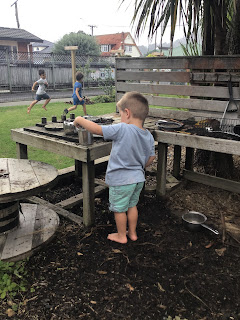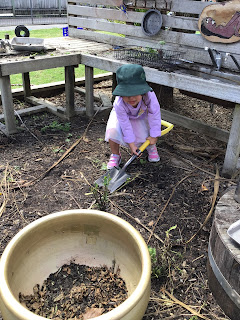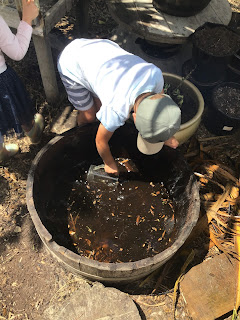Our mud kitchen at Mairtown Kindergarten was made by whānau, (Nigel, Phil and Mike, three fathers) in 2014 and has moved around the kindergarten finding its perfect spot for some time. Well, I think we may have found one! He māra kai had come to an end, currently relocating its spot within the kindergarten, so we thought this may be a perfect spot to create a mud kitchen area. The mud kitchen was re-positioned nestled underneath our Ti kouka/ cabbage tree and beside our sandpit, allowing tamariki to explore and reigniting their interest. Tamariki noticed this new space and it has become a very busy and popular spot to explore on their own and alongside their e hoa.
Mud play encourages creative thinking and supports tamariki to freely create with the open-ended resources on offer. It’s about the process not the end product. It provides opportunities for imaginative play and allows tamariki to act out their own play scenarios. Mud pies, soup, blueberry pancakes, coffee and tea and food for the dog have been a few creations made in the mud kitchen so far.
"What children learn does not follow as an automatic result from what is taught, rather, it is in large part due to the children’s own doing, as a consequence of their activities and our resources."
Actively playing with mud also has many
health benefits. “Scientists
have now confirmed something that children have always instinctively known;
playing in mud is a joyful experience. Recent research has shown that dirt
contains microscopic bacteria called Mycobacterium Vaccae which stimulates the
immune system and increases the levels of serotonin in our brains, an endorphin
that soothes, calms, and helps us to relax” (Rupiper, 2017).
Mud play allows tamariki to develop, refine and practice many skills; such as fine and gross motor skills, hand-eye coordination, turn taking, confidence and independence, opportunities to take the lead, curiosity, exploring through their senses, mathematical opportunities, language development and cognitive growth. Mud play also provides a connection to nature, opportunities to explore, ground themselves, and an appreciation for Papatūānuku and the world around them.
“The
enviro-schools kaupapa guide our teaching, and we uphold Papatūānuku as an
important kaiako; in nature herself the possibilities to learn and grow have no
limits” (Mairtown Kindergarten Philosophy, 2020).
We then raked the area so it was flat, then began the planning process. We sourced some bark from around our bark area, laid out the stepping stones creating a pathway, then added our bark. We also unscrewed the lid off our old wooden water barrel, removed the water and repurposed it to create a home for our mud. Next, we needed to plan our planting, deciding what we needed to make this space its own, and creating a little barrier between the mud kitchen and sandpit. We sourced a plant already established within our environment and after a hard day of tamariki and kaiako working together and problem solving around how to remove it, we were able to relocate some of the plant, dividing it up into smaller cuttings and enclosing the space.
Lastly, we added some metal resources, which included pots, spoons and jugs and a few self-watering hanging planters with herbs. During a visit from Kim Townsend our Professional Practice Manager, she shared her knowledge around replanting plants. From her knowledge we then decided to give our relocated plants a haircut, using the cuttings for play and hoping this would make it easier for the plant to recover from transplant shock.


































No comments:
Post a Comment